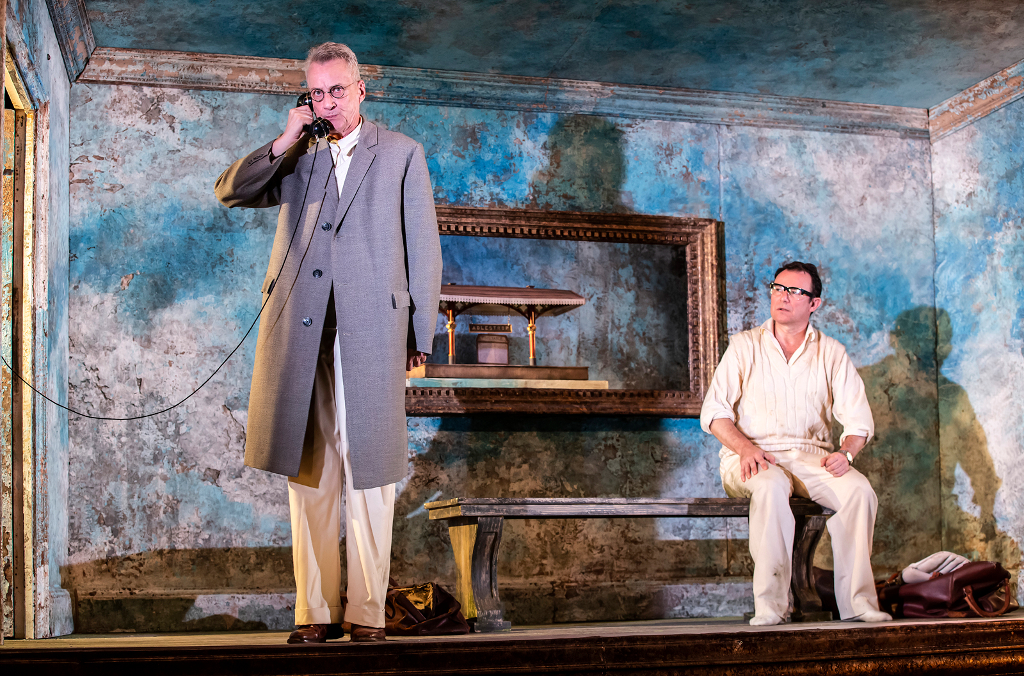Stumped, Hampstead Theatre review - Beckett and Pinter, waiting for Doggo | reviews, news & interviews
Stumped, Hampstead Theatre review - Beckett and Pinter, waiting for Doggo
Stumped, Hampstead Theatre review - Beckett and Pinter, waiting for Doggo
An hour zips by in the company of two playwrights bickering on the boundary edge

Much of cricket comprises waiting – you wait on the boundary to hear news of the toss, you wait your turn to bat, you heed the call of your batting partner to wait to see if a run is on, you wait for the rain to stop. A friend once told me that he played cricket in order to make the rest of his life seem more interesting. There is something in that observation that would appeal to both principals in this play for sure.
Two men bicker on the boundary as they wait their turn to bat. In at five and six, one is keeping score (and "working the telegraph", as cricket’s arcane argot has it), while the other tends a sore ankle, the oft-described "genteel" pursuit of recreational cricket the source of many an injury. The incoming batsmen are Samuel Beckett (scoring) and Harold Pinter (screaming – well, whinging – about the pain), the two great playwrights and lifelong lovers of the game. Over the next 70 minutes in Shomit Dutta’s tight, funny, absurd play, they spend much of their time waiting – mostly for the mysterious teammate and driver, Doggo (geddit?). Like Test cricket, the play rewards a little prior knowledge, with references to the two men’s work on stage and screen and quotes from Shakespeare and the classics fueling a very literary arm-wrestle between the two alpha males, each spiky and unwilling to back down. Stephen Tompkinson lends the older man a wit as dry at the Oval’s outfield in 1976 while Andrew Lancel as the younger Pinter (both, pictured above) can be as hostile as the West Indies attack who bowled their team to an unforgettable victory. Both men, as their work attests, know how to find the insecurity in themselves and others, and chip way at it on a nagging line and length. (Translation for cricket uninitiates: rub salt into the wound.)
Like Test cricket, the play rewards a little prior knowledge, with references to the two men’s work on stage and screen and quotes from Shakespeare and the classics fueling a very literary arm-wrestle between the two alpha males, each spiky and unwilling to back down. Stephen Tompkinson lends the older man a wit as dry at the Oval’s outfield in 1976 while Andrew Lancel as the younger Pinter (both, pictured above) can be as hostile as the West Indies attack who bowled their team to an unforgettable victory. Both men, as their work attests, know how to find the insecurity in themselves and others, and chip way at it on a nagging line and length. (Translation for cricket uninitiates: rub salt into the wound.)
Enough cricket. The game’s capacious scope (something Dutta understands in the way only a cricket tragic, or obsessive, does) can accommodate any number of metaphors, examine any aspect of life, reveal much of what makes us human – good and bad as this week’s report from the Independent Commission for Equity in Cricket shows to devastating effect. Life, as some wag once remarked, is a microcosm of cricket.
While waiting to bat, Pinter and Beckett muse on each others’ careers, and how they’ve never written about the Cotswolds (the region in which they find themselves) nor even about the outdoors much at all. As is the case on the 22-yard strip of rolled grass on which batter and bowler duel, what matters most to them is what goes on inside the head, not outside the room.
Later, they wait near a tree (natch!) for their lift that may or may not come, a little dishevelled from the booze taken after the match and ponder existence itself, trying to locate Doggo in the scorebook, the ultimate arbiter of a cricketer’s presence. Pinter discovers, to his shame, that his shambolic innings included the run out without facing (the closest cricket gets to erasing a player from planet Earth) of Arthur Wellard, a celebrated England batsman and notorious smiter of sixes who did turn out occasionally for The Gaieties, Pinter’s (and Dutta’s) club. Could he be after revenge in leaving them to fester in the fearful silence of a village green at midnight?
The final scene finds them on a rural railway platform, waiting for a train that may or may not be timetabled, Pinter in a fever dream, Beckett both there and not there – like the train. It captures a world before smartphones when few places were as isolated as a dark, deserted station, promising progress, but uncertain as to when, the means of salvation always the other side of the horizon.
David Woodhead’s gorgeous set comes bathed in Howard Hudson’s light: sharp then dim, perfectly suggestive of an English high summer day drifting into a warm, still night. Props are introduced through an endlessly amusing trompe l'oeil backdrop, and their authenticity positions the play perfectly in the early 1960s (which, given cricket’s reluctance to move with the times, is the early 1950s for anyone else).
Just a Jonny Bairstow pull shot away from Lord’s itself, Guy Unsworth’s production at Hampstead Theatre knows an audience that it is unafraid to flatter and challenge and, like the Ashes Test to be played concurrently with its run, never patronises them by making things too obvious; the absurdity of it all is ever present.
Cricket and the works of Pinter and Beckett enjoy an outsize influence on the cultural life of the nation compared to their popularity, but their enduring collective presence speaks to tapping into a certain element in the psyche, a place that is definitely there, but never quite visible. You’ll find it – all you need to do is wait.
rating
Explore topics
Share this article
The future of Arts Journalism
You can stop theartsdesk.com closing!
We urgently need financing to survive. Our fundraising drive has thus far raised £49,000 but we need to reach £100,000 or we will be forced to close. Please contribute here: https://gofund.me/c3f6033d
And if you can forward this information to anyone who might assist, we’d be grateful.

Subscribe to theartsdesk.com
Thank you for continuing to read our work on theartsdesk.com. For unlimited access to every article in its entirety, including our archive of more than 15,000 pieces, we're asking for £5 per month or £40 per year. We feel it's a very good deal, and hope you do too.
To take a subscription now simply click here.
And if you're looking for that extra gift for a friend or family member, why not treat them to a theartsdesk.com gift subscription?
more Theatre
 Hamlet, National Theatre review - turning tragedy to comedy is no joke
Hiran Abeyeskera’s childlike prince falls flat in a mixed production
Hamlet, National Theatre review - turning tragedy to comedy is no joke
Hiran Abeyeskera’s childlike prince falls flat in a mixed production
 Rohtko, Barbican review - postmodern meditation on fake and authentic art is less than the sum of its parts
Łukasz Twarkowski's production dazzles without illuminating
Rohtko, Barbican review - postmodern meditation on fake and authentic art is less than the sum of its parts
Łukasz Twarkowski's production dazzles without illuminating
 Lee, Park Theatre review - Lee Krasner looks back on her life as an artist
Informative and interesting, the play's format limits its potential
Lee, Park Theatre review - Lee Krasner looks back on her life as an artist
Informative and interesting, the play's format limits its potential
 Measure for Measure, RSC, Stratford review - 'problem play' has no problem with relevance
Shakespeare, in this adaptation, is at his most perceptive
Measure for Measure, RSC, Stratford review - 'problem play' has no problem with relevance
Shakespeare, in this adaptation, is at his most perceptive
 The Importance of Being Earnest, Noël Coward Theatre review - dazzling and delightful queer fest
West End transfer of National Theatre hit stars Stephen Fry and Olly Alexander
The Importance of Being Earnest, Noël Coward Theatre review - dazzling and delightful queer fest
West End transfer of National Theatre hit stars Stephen Fry and Olly Alexander
 Get Down Tonight, Charing Cross Theatre review - glitz and hits from the 70s
If you love the songs of KC and the Sunshine Band, Please Do Go!
Get Down Tonight, Charing Cross Theatre review - glitz and hits from the 70s
If you love the songs of KC and the Sunshine Band, Please Do Go!
 Punch, Apollo Theatre review - powerful play about the strength of redemption
James Graham's play transfixes the audience at every stage
Punch, Apollo Theatre review - powerful play about the strength of redemption
James Graham's play transfixes the audience at every stage
 The Billionaire Inside Your Head, Hampstead Theatre review - a map of a man with OCD
Will Lord's promising debut burdens a fine cast with too much dialogue
The Billionaire Inside Your Head, Hampstead Theatre review - a map of a man with OCD
Will Lord's promising debut burdens a fine cast with too much dialogue
 50 First Dates: The Musical, The Other Palace review - romcom turned musical
Date movie about repeating dates inspires date musical
50 First Dates: The Musical, The Other Palace review - romcom turned musical
Date movie about repeating dates inspires date musical
 Bacchae, National Theatre review - cheeky, uneven version of Euripides' tragedy
Indhu Rubasingham's tenure gets off to a bold, comic start
Bacchae, National Theatre review - cheeky, uneven version of Euripides' tragedy
Indhu Rubasingham's tenure gets off to a bold, comic start

Add comment